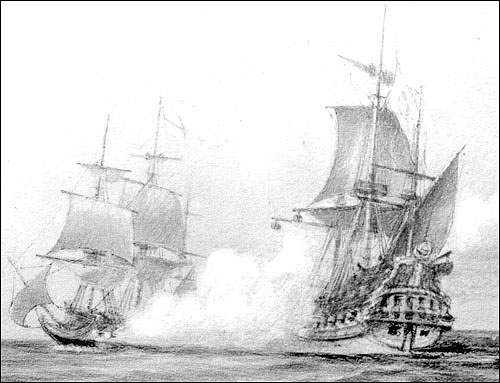Newfoundland and the American Revolutionary War, 1775-1783
The fisheries and society at Newfoundland always suffered when war broke out in the North Atlantic. The fisheries and the trade depended on secure sea lanes which, in time of war, were threatened by enemy warships and privateers. Moreover, war diverted fishermen into the navy, though the numbers were never close to those promised in peace time by the fishing merchants. As a result, every time that war broke out, people chose or were forced to stay in Newfoundland rather than return to England. The migratory fisheries ( ship fishery, bye boat fishery, bank fishery) decreased, and the sedentary boat fishery increased. When the war ended, the situation reversed itself.

Much of this pattern manifested itself after 1775, when the American Revolution began. However, by the time peace was restored in 1783, significant and permanent changes had taken place. The resident population at Newfoundland now exceeded the temporary and migratory populations. There were new market opportunities in the Caribbean, where the Americans were now excluded. Most importantly, perhaps, the migratory bye boat fishery found itself seriously weakened after the war by the persistence of high wages, and by the loss of fishing rooms taken over by residents. This had alarming implications for the long-term health of the bank fishery, which earned a considerable amount of income by transporting the boat fisheries' hired labour. The ancient ship fishery, of course, was virtually dead even before the American Revolution. Finally, the emergence of the newly independent United States caused regulatory and diplomatic adjustments which affected trading patterns.
Obviously, the American Revolution did not cause any of this to happen, since many of these changes were already visible before 1775. But the American Revolution accelerated the changes, making many of them irreversible.




